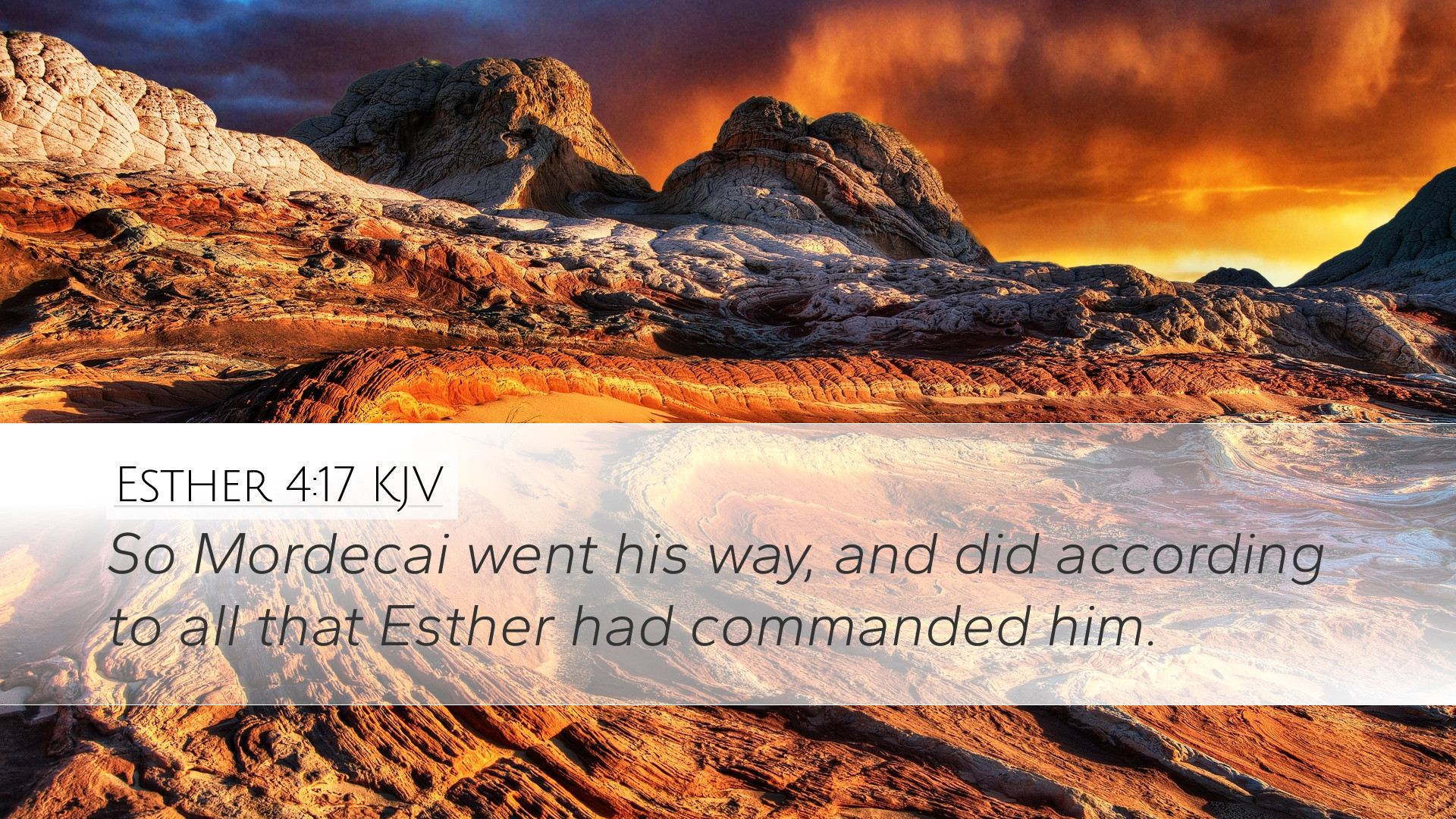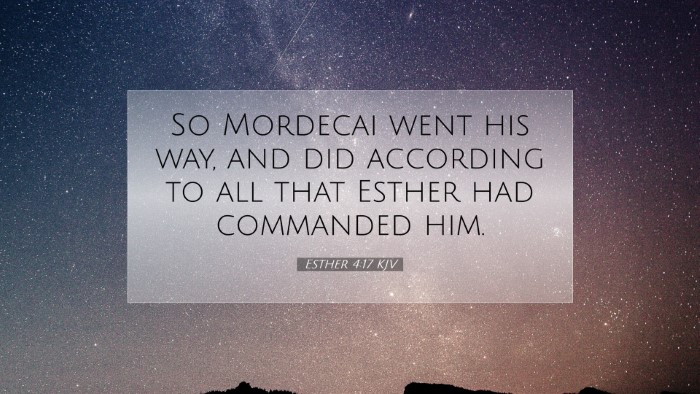Old Testament
Genesis Exodus Leviticus Numbers Deuteronomy Joshua Judges Ruth 1 Samuel 2 Samuel 1 Kings 2 Kings 1 Chronicles 2 Chronicles Ezra Nehemiah Esther Job Psalms Proverbs Ecclesiastes Song of Solomon Isaiah Jeremiah Lamentations Ezekiel Daniel Hosea Joel Amos Obadiah Jonah Micah Nahum Habakkuk Zephaniah Haggai Zechariah MalachiEsther 4:17
Esther 4:17 KJV
So Mordecai went his way, and did according to all that Esther had commanded him.
Esther 4:17 Bible Commentary
Commentary on Esther 4:17
Esther 4:17 reads: "So Mordecai went his way, and did according to all that Esther had commanded him." This verse concludes a significant moment in the narrative of Esther, where the themes of obedience, courage, and divine providence converge. The verse serves as a pivotal point in the story where Esther makes her decision to approach the king, knowing the risks involved.
The Context of Esther 4:17
This moment occurs after Mordecai has urged Esther to intercede for her people, the Jews, who are threatened with annihilation. The tension is palpable; Mordecai's words challenge Esther's identity and purpose. Her hesitance and eventual obedience are key themes reflected in this verse.
Mordecai's Role
Matthew Henry highlights the pivotal role of Mordecai as a figure of faithfulness and as a mentor to Esther. He exemplifies the strength needed to stand up for one’s people and encourages Esther to embrace her position as queen for such a time as this.
Albert Barnes notes that Mordecai's actions demonstrate a blend of wisdom and defiance. His adherence to Esther’s command illustrates a deep-seated loyalty and recognition of the urgency of their plight.
Esther's Compliance
Esther's response to Mordecai's call to action is one of significant courage. Adam Clarke emphasizes her leadership; she is not simply complying because she is told to but is acknowledging her destiny. This is a significant moment of transformation for her - from an isolated queen to a voice for her people.
Theological Implications
The act of complying with Mordecai’s counsel speaks volumes about obedience in the face of fear. Matthew Henry comments on Esther's courage, stating that she was ready to face death for her people, illustrating true faith.
- Divine Providence: The story showcases how God’s providence operates through human actions. Esther’s willingness to act underscores the belief that God places individuals in specific positions for a purpose.
- Faith in Action: Esther's move towards action reflects the necessity of faith translated into deeds. Albert Barnes suggests that faith without actions is dead; hence, Esther's obedience sets a precedence for active faith in the lives of believers.
The Call to Action
The command given by Esther to Mordecai emphasized a collective response from the Jewish community - a move towards fasting and prayer. Adam Clarke elucidates that they were gearing up not just for a physical confrontation but a spiritual one.
Fasting and Prayer
In the narrative leading up to this verse, Esther asks Mordecai to gather all the Jews in Shushan to fast for three days. This act signifies their reliance on God, a theological point that Henry reinforces: when faced with dire circumstances, turning to prayer and seeking divine intervention is essential.
Symbolism in Obedience
Esther's obedience holds a deep spiritual and moral symbolism. Barnes notes that it illustrates the broader biblical principle of submission to wise counsel, and it enriches the theme of community involvement in crisis, alerting the faithful to the necessity of collective action in faith.
Conclusion
Esther 4:17 serves as a testimony to the power of obedience and communal faith in God during times of distress. It reminds pastors, students, theologians, and Bible scholars of the importance of acting upon God’s call, even amid fear. The collaborative actions of Mordecai and Esther bring forth a narrative showcasing God’s sovereignty at work through human obedience. Henry, Barnes, and Clarke provide insightful reflections that deepen the understanding of this verse, encouraging a faithful response to the call of God in our own lives.


